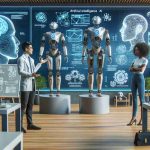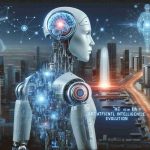The rapid advancement of artificial intelligence (AI) technology is driving a surge in energy demand within data centers. Powering AI software requires substantial computer power and the utilization of large databases, leading to high energy consumption for both running AI chips and maintaining cooling systems.
Estimates currently indicate that the energy consumption of AI software worldwide equals the total energy need of a country the size of the Netherlands. However, analysts predict that this demand will significantly increase in the coming years.
Data centers currently account for approximately one to two percent of global electricity consumption, a figure expected to double in the next decade. This projection raises concerns about the strain on the electricity network and the potential trade-offs between expanding data centers and ensuring basic household electricity needs.
Data center expert Loek Wilden from Schneider Electric emphasizes the inevitable rise in energy consumption due to the growing digitalization of businesses and governments. While indicating the need for increased energy efficiency, Wilden highlights the potential for innovative designs and technologies to mitigate energy demands.
The narrative of reducing energy consumption in data centers pivots towards smaller, more efficient facilities that offer advantages such as flexible placement near industrial areas or urban centers. By adopting technologies like liquid cooling and exploring distributed data center models, the energy footprint of these facilities can be optimized.
Looking ahead, a shift towards a blend of large and medium-sized data centers surrounding urban hubs, alongside smaller distributed centers, is foreseen as a more sustainable approach. This diversification aims to alleviate pressure on the energy network and promote energy sharing initiatives to achieve a balanced energy ecosystem.
With the next five years deemed critical for addressing energy grid challenges, the industry is expected to address barriers such as permitting, power supply, and talent acquisition through market dynamics. Wilden anticipates that with increased investment and a skilled workforce, the sector will navigate these obstacles and drive towards a more energy-efficient future.
The Future of Energy Consumption in Data Centers: Exploring Uncharted Realms
As the world hurtles towards an increasingly digital future, data centers stand as the fortresses of this transformation. The surge in energy demand driven by artificial intelligence (AI) technologies within these data hubs sparks pivotal questions about sustainability and efficiency. In this quest for knowledge, it is imperative to address some crucial aspects that shape the future of energy consumption in data centers.
What innovations are on the horizon to optimize energy consumption in data centers?
While the current discourse emphasizes energy efficiency, recent developments point towards novel approaches such as utilizing renewable energy sources to power data centers. Integrating solar or wind energy into data center operations not only reduces carbon footprint but also offers long-term cost savings.
Moreover, advancements in energy storage technologies, like cutting-edge battery systems, present opportunities to store excess energy generated during low-demand periods for later use, thereby enhancing overall energy efficiency in data centers.
What are the key challenges and controversies associated with the growing energy consumption in data centers?
One of the pressing challenges lies in balancing the exponential growth of data centers with environmental concerns. The mining of rare earth minerals for hardware components, coupled with the disposal of electronic waste, raises sustainability controversies that demand attention.
Furthermore, the energy-intensive nature of data centers poses a critical dilemma in terms of resource allocation. The competition between powering data centers and meeting basic household electricity needs underscores the urgency to find sustainable solutions that can harmonize energy consumption across diverse sectors.
Advantages and Disadvantages of the Evolving Data Center Ecosystem
Advantages:
– Enhanced energy efficiency through innovative cooling technologies and distributed data center models.
– Opportunities for renewable energy integration to reduce carbon footprint.
– Potential for improving grid resilience through energy storage solutions.
– Innovation in design and construction for sustainable data center infrastructure.
Disadvantages:
– Environmental impact associated with energy-intensive operations.
– Strain on existing electricity networks due to escalating energy demands.
– Challenges in managing electronic waste and rare earth mineral extraction.
– Balancing economic growth with sustainable energy practices amid data center expansion.
As the landscape of data centers evolves, stakeholders must navigate these advantages and pitfalls to chart a sustainable course forward. By addressing key questions, challenges, and controversies, the industry can harness innovation and collaboration to shape a future where energy consumption in data centers aligns with global sustainability goals.
For more insights on sustainable energy solutions and emerging trends in data center technology, visit International Energy Agency.






















